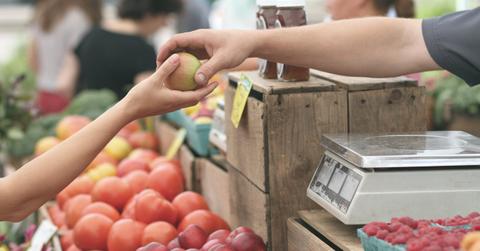This German Startup Wants To Bring Vertical Farming Right To Your Store
German startup Infarm plans to install stacked hydroponics tanks in supermarkets, shopping malls and restaurants so customers can pick their own greens, herbs, veggies and fruits without any of the transportation, toxic fertilizer, or lost nutrition of big agriculture processes.
Updated May 26 2019, 2:33 p.m. ET

Imagine going into a grocery store and picking your produce fresh off the vine.
That’s the concept behind German startup Infarm, which has already begun installing stacked hydroponics tanks in supermarkets, shopping malls and restaurants so customers can pick their own greens, herbs, veggies and fruits without any of the transportation, toxic fertilizer, or lost nutrition of big agriculture processes.
Transportation of food isn't great for the environment.
World food production grew exponentially between 1968 and 1998, expanding by 84 percent as the population ballooned by 91 percent. To meet demand, transportation of the food produced exploded by 184 percent. That meant getting more food to more people—but came at a striking cost to the environment. Today, an average American meal includes ingredients from at least five countries outside of the United States.
The combined carbon emissions of all locally grown food is less than the carbon dioxide emitted for any one imported product. For all of these reasons, the local food movement has been gaining popularity. Now, it’s nothing surprising to walk into a Whole Foods or the produce aisle of any generic supermarket and have organic products on display along with information on where they were grown.
But what if there was no transportation, no farm, and no pesticides, herbicides or artificial fertilizers whatsoever?
Vertical farming is coming to grocery stores.
Infarm, a startup of more than 40 people based out of Berlin, Germany, is angling to create a sustainable, perpetual indoor growing system for restaurants, groceries and shopping malls that would entirely eliminate the need to transport produce from point A to B—doing away with all associated emissions and costs.
Infarm’s modular design means setups can be as small or large as is necessitated by the market. Automation will allow nutrients, irrigation and lighting to be monitored by sensor and initiated by an online irrigation and nutrition system. This method of farming reduces any risk of a dry or wet season destroying output, pests and human error.
The face of farming is changing drastically.
The modular system means small Infarm kits can be set up in storefronts and allow interaction with customers never before seen in vertical farming operations.
“When we presented our idea three or four years ago, people looked at us as though we [had] lost our mind,” Infarm co-founder Erez Galonska told TechCrunch. “We are the first company in the world that has put vertical farming in a supermarket. We did it last year with Metro Group, which is one of the biggest wholesalers in Europe, and now we are facing very big demand from other supermarkets that want to do the same.”
When everything is sold fresh, you can grow the best of the best.
Because Infarm kits grow food that’s picked as soon as it’s ripe, there is no longer a need to grow varieties of food simply because of a long shelf life. Infarm produce can be grown for its flavor, color and nutritional value. And growing indoors totally bypasses a limited growing season.
“People are seeking more fresh produce, more sustainable produce,” Osnat Michaeli, another of Infarm’s founders, told TechCrunch. “Our eating habits have created a demand for produce that is available 365 days a year, even though some varieties may only be seasonal and/or produced on the other side of the globe… The food that does survive the long journey is not fresh, lacks vital nutrients, and in most cases is covered in pesticides and herbicides.”